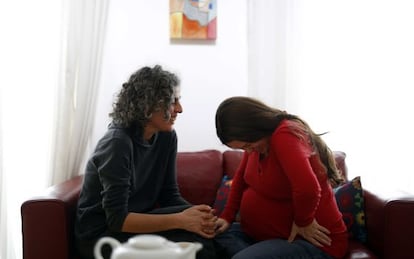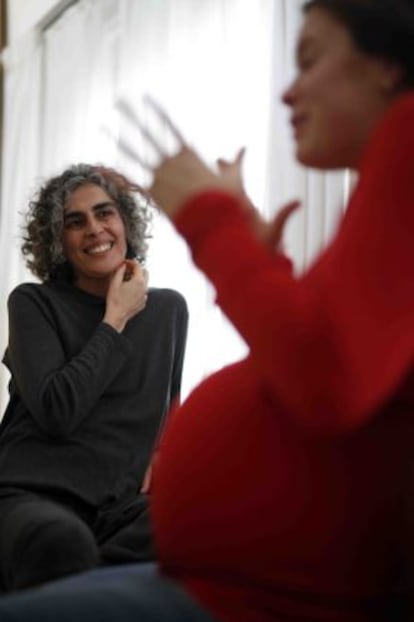Doulas defend their profession
Providers of support to pregnant women uphold their work in wake of harsh nurses’ report

After a two-hour conversation inside her Madrid apartment, Paca Muñoz, who has been a doula childbirth assistant for the last six years, kindly offers her interviewer some lunch.
— Shall I make you some scrambled eggs?
— With placenta inside...?
The obvious joke floats around the kitchen for a second, then Paca laughs out loud. “Yes, I happen to have some right here!” she jokes, pretending to open the refrigerator.
Her cheerfulness is stronger than the “sadness” she felt last week, when Spain’s nurses released a harsh report accusing non-medically trained doulas of appropriating the job of qualified midwives, and even of endangering the lives of mothers and babies.
“Great emotional support”
In 2012, Claudia, 38, decided to give birth to her third child at home. Her second delivery had been "the usual thing" at a hospital. "I was given no options and nobody asked me what I thought about anything. It was very hard. I was very clear about not wanting to go through that again," she says.
So she hired a midwife who works with a doula, paying €1,200 for their services before, during and after childbirth. "She was a great emotional support," says Claudia about her doula.
"The midwife looks after the health of the mother and the baby. The doula's role is very different and has nothing to do with healthcare. In my case, she took care of other needs, from holding my hand to covering me with a blanket when I was cold to watching over my two other children. Little issues of logistics and support, of being by my side. The doula does not interfere with the midwife or the mother's decisions. She supports those decisions, whatever they may be."
Claudia explains that both women had perfectly differentiated roles. "While the midwife checked the contractions and dilation and the baby's heartbeat, the doula sought to make me comfortable. When I was done giving birth, all my clothes were already in the washing machine and she had made me a glass of orange juice. Obviously, a midwife doesn't do that."
To her, the nurses' report only reveals this group's "ignorance" when it comes to doulas. She also considers it "unfair" because it does not describe their work, simply bad practices by a few isolated practitioners.
At a press conference, spokespeople for the General Nursing Council (CGE) claimed that these emotional assistants practice rites such as burning the umbilical cord with a candle and “encourage cannibalism” by forcing mothers to eat their own placenta.
CGE president Máximo González Jurado said he would send the report to state prosecutors for analysis and ask the Health Ministry to act against doula activity in Spain.
“Force them to eat the placenta? Never,” answers Paca, who has a degree in psychology and used to do social work. Since becoming a doula, she has “accompanied” around 200 women during childbirth, most of the time in their homes and in the presence of a licensed midwife.
“A doula does not give advice; what we do is listen to the mother’s needs,” she explains. Paca has never told her clients to eat their placenta, but around 40 percent of them asked for it anyway, she reports.
“A little piece like this inside a fruit shake,” she says, pointing at the tip of her pinkie finger. “I understand it sounds heavy duty. There’s a doctor in the Canary Islands who is investigating the benefits of it, but nothing conclusive is out yet...”
Paca Muñoz does not talk about ancestral cultures, goddesses or Mother Earth. She understands that people find it all very odd, but does not try to convince anyone of anything.
All the doulas consulted on the subject of the nurses’ report said the same thing as Paca: “That’s right, we are not health professionals. That is why we don’t make a diagnosis, we do not propose treatments, we do not perform explorations, we don’t assist with childbirth all by ourselves. We don’t take their blood pressure or even their temperature.”
The second item in the code of ethics of the Spanish Doula Association stipulates that these assistants are not health workers. “Some of them act beyond their duties, but it’s not a regular occurrence,” admits Muñoz.
So what exactly does a doula do?
Paca Muñoz pulls out a text document with around 20 points listed on it. These range from “providing objective information” to “looking in the eyes” and “holding hands.”
But what is “providing objective information”? This is the question posed by Isabel Salgado, of the Barcelona Nursing Association. “Health advice is a sanitary act in itself, not just anyone should give it ... For instance, if they help a woman choose a hospital, how do you know what might be moving them to do so?”

“I get really hyper, so I needed some emotional assistance,” explains Ana, the assumed name of a 37-year-old high-school teacher who hired Paca Muñoz to help her give birth at Torrejón Hospital in Madrid.
“She gave us the protocol for all the hospitals, and we picked the one we liked best. Besides, Paca told us that this hospital rolled out the red carpet for doulas,” she explained. EL PAÍS unsuccessfully tried to talk to a midwife at Torrejón Hospital through its press department.
“During the delivery, the doula never passed judgment, not when they [the doctors] programmed it, nor when I asked for the epidural. The gynecologist and the midwives made all the decisions, while Paca breathed with me,” Ana recalls. “That report that came out makes it sound like women are stupid and unable to make our own decisions.”
Like many other doulas – the name comes from the Greek for “woman’s servant” – Paca decided to turn her life around after getting pregnant.
“I had a very stressful job in the field of social prevention, so I decided to drop it,” he says.
Finding herself with time on her hands, she signed up for a music therapy course, and ended up giving birth inside a bathtub. Three years and “all the La Leche League meetings” later, Paca realized that other mothers were turning to her for support. Then, at a bioculture fair, she attended a talk by a doula.
A doula does not give advice; what we do is listen to the mother’s needs”
Paca Muñoz, doula
“Close your eyes and think of a forest,” said Ileana Rota, closing her own eyes under her head of wild graying curls. “You’ve never entered the forest, but there is someone who knows it well, and she is by your side.”
That is how the 45-year-old doula from Seville began her talk. “When it was over, I walked right up to her and asked: ‘Where do I pay to do this professionally?’” remembers Paca.
The answer was at an academy called Nagual that taught yoga and other activities. The cost of the doula course was €2,000 for 10 weekends of training stretched out over the space of a year.
Now, Paca teaches there along with midwives, physiotherapists, nutritionists and gynecologists. She also works with around three clients a month, earning €500 to €800 for anywhere between four and six or more weeks of support.
Before childbirth, Paca alleviates the mother-to-be’s fears, takes her out for walks and even fields her calls. After the baby is born, “I usually end up cleaning their kitchen,” she laughs. “And then I make some tea and sit down with them for a talk. How do you feel? What do you need?”
After paying her Social Security contribution, which in Spain starts at around €250 a month, she is left with “a little over €1,000.”
Health advice is a health worker’s act in itself, not just anyone should give it”
Isabel Salgado, Barcelona Nursing Association
Paca Muñoz says she has never felt any tension working with midwives. Yet it is easy to imagine the delicate diplomacy necessary inside a delivery room containing a woman in labor, her partner, her gynecologist, her midwives, and to top it all off, her doula.
Muñoz says that inside the delivery room, a doula is like a ninja: “A silent presence, voicing no opinions, breathing with the mother, touching her arm...”
But what if the woman giving birth demands something that health personnel are not willing to do?
“I don’t get into that, but I support the mother in her own negotiation,” says Muñoz. A case in point: a woman who gave birth to twins after a C-section and asked for a voluntary discharge because she had been separated from her babies. The woman asked Paca to go talk to the nurses about it.
“But I could not interfere with a medical decision, nor mediate between the midwife and the patient,” she explains. “So I placed the nurse call button in her hand and told her: ‘You’re strong. I’m with you. You’re not crazy. Tell them what you think.’”
Tu suscripción se está usando en otro dispositivo
¿Quieres añadir otro usuario a tu suscripción?
Si continúas leyendo en este dispositivo, no se podrá leer en el otro.
FlechaTu suscripción se está usando en otro dispositivo y solo puedes acceder a EL PAÍS desde un dispositivo a la vez.
Si quieres compartir tu cuenta, cambia tu suscripción a la modalidad Premium, así podrás añadir otro usuario. Cada uno accederá con su propia cuenta de email, lo que os permitirá personalizar vuestra experiencia en EL PAÍS.
¿Tienes una suscripción de empresa? Accede aquí para contratar más cuentas.
En el caso de no saber quién está usando tu cuenta, te recomendamos cambiar tu contraseña aquí.
Si decides continuar compartiendo tu cuenta, este mensaje se mostrará en tu dispositivo y en el de la otra persona que está usando tu cuenta de forma indefinida, afectando a tu experiencia de lectura. Puedes consultar aquí los términos y condiciones de la suscripción digital.








































